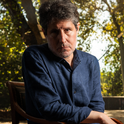The first time I contracted amoebic dysentery, it was on a three-day hike up Mount Kilimanjaro in Tanzania. I had so many bowel movements that I ran out of toilet paper and had to resort to using pages torn from Shiva Naipaul's excellent travel book, North of South; and then to leaves; and finally, as we went higher and the vegetation became less luxuriant, to smooth stones. Near the top, my difficulties were compounded by altitude sickness and I keeled over on a petrified lava field between two snow-capped volcanic cones at about 1,800 feet. I lay on my back, semi-conscious and "half in love with easeful death"; with the alpine sunshine on my eyelids and the extraordinary silence ringing in my ears. After a while I heard the familiar hawking and spitting of our guide, who kindly helped me up, assisted me back down the mountain and made me a nice cup of tea.
About a week later, I managed to get the dysentery under control with large doses of antibiotics. However, my problems in that area weren't yet over because, to my horror, I discovered that my anus had become infected and what felt like an enormous abscess was beginning to form there. As it grew inexorably larger day by day, the pain got worse and my movements became more restricted. To begin with, I limped. But as the abscess filled out like a ripening plum, the pain increased to such an extent that I couldn't sit, stand or walk; for the best part of a week all I could do was kneel down in a Codydramol-induced stupor.
It was a situation which required privacy. But at the time, as a member of a large party of package tourists on a camping holiday in the remote parts of east Africa, there was little privacy to be had. And the further we went from civilisation, the more my abscess seemed to flourish. On the plus side, I have to say that it did introduce a welcome note of levity into what had previously been a rather dour, uncommunicative group of fellow travellers. I myself had to abandon the Clint Eastwood persona which I had been cultivating and go for something more along the lines of George Formby. In fact the abscess on my anus became adopted as a sort of group mascot: it was an unfailingly successful conversational gambit; its progress became a source of universal interest; its prognosis the subject of endless debate and speculation.
By the time we had reached the Serengeti game reserve, the pain was such that I cried out involuntarily every time the lorry bounced over a pothole. It was wearing me out. As we set up camp for the evening, I decided to ask Johannes, who worked in Switzerland as a nurse, if he would mind having a look at it and describing it for me. We walked a little way off and I pulled down my shorts and bent over. "What does it look like?" I asked anxiously. He stood and racked his brains, trying to think of an English word that would most accurately describe it. "Horse chestnut," he said decisively, surprising me with the range of his English vocabulary.
John, our driver and tour leader, sauntered over for a look. He was a huge, blond, muscle-bound surfie from Perth in Australia. He was so macho that he was an example to us all. He never wore anything except a tiny pair of bathers with an orange stripe down one side; he even walked up Kilimanjaro in his bare feet. My failure to reach the top strengthened his conviction that all English men are effeminate. He peered judiciously at my back passage for a while, then, obviously quite impressed, said: "Can I get a photo of that to show me mates back home?" and went to get his camera. He hurried back, and as he focused his telephoto lens from close range, said: "Mate, could you part your cheeks a bit?"
Later, as the others sat-and I knelt-around the camp fire, John had a suggestion: "Back home in the bush, what the guys do if they get a boil is put a milk bottle over it and heat up the other end over the fire to draw out the pus." I was more than willing to try it out but nobody could find a suitably sized bottle, so I just had to hang on, either until the abscess swelled to its optimum tumescence and burst, or until we arrived at the next large town where I could finally have it lanced at a clinic.
My abscess eventually burst while I was waiting to see a doctor at Kigale Hospital in Rwanda. The pain vanished instantly, as if it had never existed. A Belgian doctor performed a minor mopping-up operation and advised me to sit in a washing up bowl of warm water and Dettol at least twice a day for the rest of the trip.
My triumphant return to the hotel was greeted with a round of applause and a surprise party, complete with coloured balloons and a sponge cake with the words "Bottoms Up" iced on the top.
When I returned to England, I had to go into hospital to have some fine tuning done on my bum: as a "fissure" had appeared, which constantly leaked and made me permanently smell of faeces. As I was about to be wheeled into the hospital operating theatre, drowsy with Pethedine, the surgeon appeared, pulling on his rubber gloves. "Ah, Mr Clarke," he said. "Tell me, was your peri-anal abscess, er, mechanically induced?" n
Jeremy Clarke











